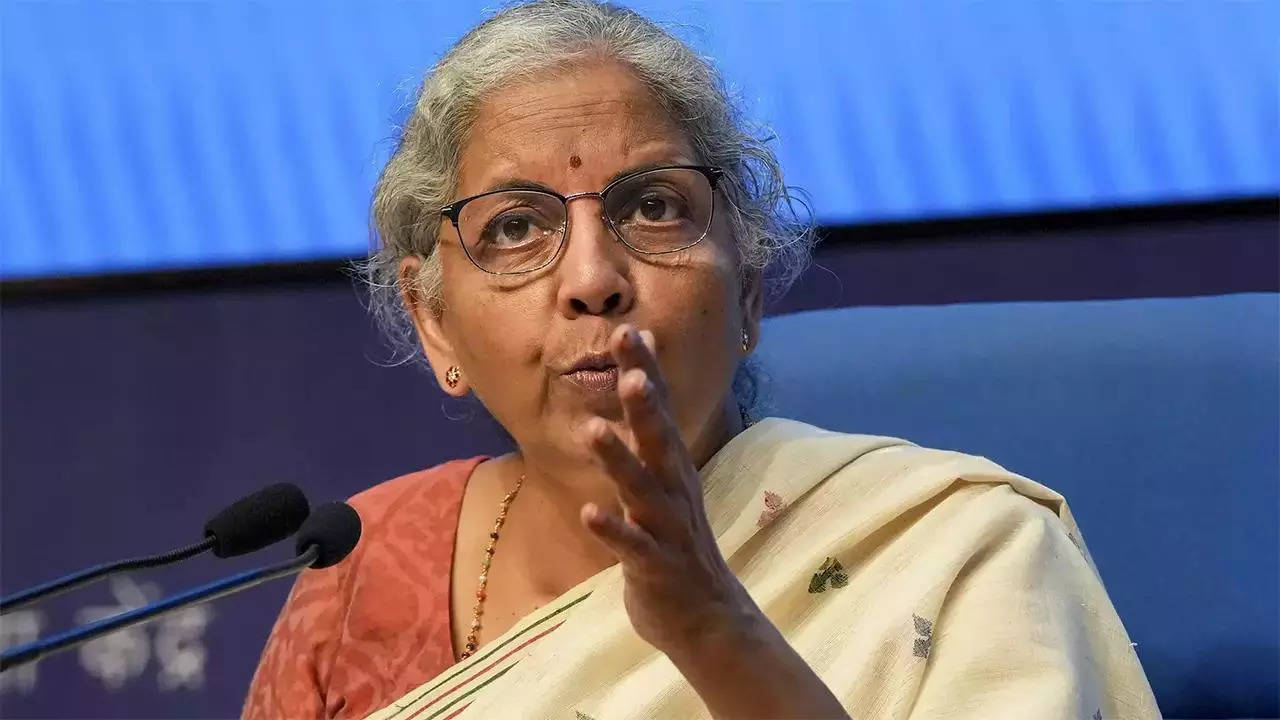NEW DELHI: Finance Minister Nirmala Sitharaman on Saturday urged the private sector to come forward and support the Sustainable Development Goals (SDGs) saying it is the collective responsibility of all stakeholders to participate and contribute in this endeavour. Speaking at an event organised on the sidelines of the IMF-World Bank Annual meetings at Marrakesh in Morocco, the minister exuded confidence that MDB reform process emanating from the G20 deliberations will prompt multilateral development banks (MDBs) to maximise investments into developing nations.
The 17 SDGs adopted by United Nations member states in 2015 were aimed at addressing a wide range of social, economic, and environmental challenges by 2030, she said.
“India under its Presidency has called upon all G20 members to collectively resolve to fully and effectively implement the 2030 Agenda and accelerate progress toward the SDGs, in a timely manner,” Sitharaman said.
Observing that the SDGs provide a shared blueprint for peace and prosperity for people and the planet, the Finance Minister said, “It is the collective responsibility of all stakeholders to participate in and contribute to this endeavour. I invite the private sector to come forward and join the pursuit of this global vision.
The global progress on SDGs is off-track with only close to 12 per cent of the targets on track, she said, adding India under its Presidency has called upon all G20 members to collectively resolve to fully and effectively implement the 2030 Agenda and accelerate progress toward the SDGs, in a timely manner.
It may be noted that the 17 Sustainable Development Goals (SDGs) adopted by United Nations member states in 2015 were aimed at addressing a wide range of social, economic, and environmental challenges by 2030, she said.
With only seven years remaining to achieve the shared goals set out in the Agenda 2030, she said, it is essential to work towards closing the financing gap by fostering global cooperation and aligning financial resources towards these goals..
For the first time, during India’s G20 Presidency, the agenda of Sustainable Finance has been extended to cover financing for SDGs, in addition to Climate Finance, she said.
To bridge the SDGs financing gap, she said, especially for Emerging Markets and Developing Economies (EMDEs), there is a need to enhance innovative financing approaches such as blended finance and risk-sharing tools which could be used to leverage private finance for scaling up sustainable finance.
Stressing that MDBs reform process is needed, she said, “these institutions (MDBs) have stood by us for nearly 70-80 years, but gradually now showing signs of fatigue and because of that many of the objectives which were to be served other than restoring Europe after the war, are still waiting to be served.
These very institutions now will have to be revived to meet with the current challenges of the 21st century, she said.
The 17 SDGs adopted by United Nations member states in 2015 were aimed at addressing a wide range of social, economic, and environmental challenges by 2030, she said.
“India under its Presidency has called upon all G20 members to collectively resolve to fully and effectively implement the 2030 Agenda and accelerate progress toward the SDGs, in a timely manner,” Sitharaman said.
Observing that the SDGs provide a shared blueprint for peace and prosperity for people and the planet, the Finance Minister said, “It is the collective responsibility of all stakeholders to participate in and contribute to this endeavour. I invite the private sector to come forward and join the pursuit of this global vision.
The global progress on SDGs is off-track with only close to 12 per cent of the targets on track, she said, adding India under its Presidency has called upon all G20 members to collectively resolve to fully and effectively implement the 2030 Agenda and accelerate progress toward the SDGs, in a timely manner.
It may be noted that the 17 Sustainable Development Goals (SDGs) adopted by United Nations member states in 2015 were aimed at addressing a wide range of social, economic, and environmental challenges by 2030, she said.
With only seven years remaining to achieve the shared goals set out in the Agenda 2030, she said, it is essential to work towards closing the financing gap by fostering global cooperation and aligning financial resources towards these goals..
For the first time, during India’s G20 Presidency, the agenda of Sustainable Finance has been extended to cover financing for SDGs, in addition to Climate Finance, she said.
To bridge the SDGs financing gap, she said, especially for Emerging Markets and Developing Economies (EMDEs), there is a need to enhance innovative financing approaches such as blended finance and risk-sharing tools which could be used to leverage private finance for scaling up sustainable finance.
Stressing that MDBs reform process is needed, she said, “these institutions (MDBs) have stood by us for nearly 70-80 years, but gradually now showing signs of fatigue and because of that many of the objectives which were to be served other than restoring Europe after the war, are still waiting to be served.
These very institutions now will have to be revived to meet with the current challenges of the 21st century, she said.
Denial of responsibility! Todays Chronic is an automatic aggregator of the all world’s media. In each content, the hyperlink to the primary source is specified. All trademarks belong to their rightful owners, all materials to their authors. If you are the owner of the content and do not want us to publish your materials, please contact us by email – todayschronic.com. The content will be deleted within 24 hours.


